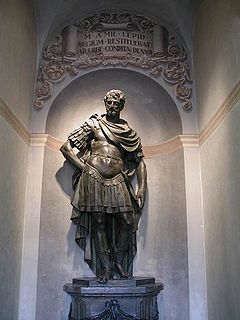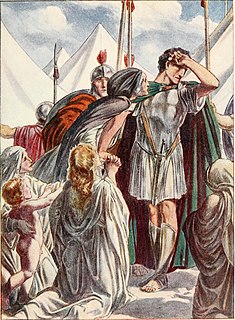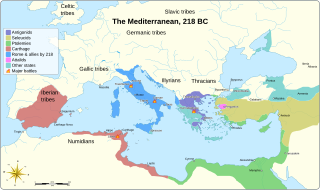Related Research Articles

Quintus Fabius Maximus Verrucosus, surnamed Cunctator, was a Roman statesman and general of the third century BC. He was consul five times and was appointed dictator in 221 and 217 BC. He was censor in 230 BC. His agnomen, Cunctator, usually translated as "the delayer", refers to the strategy that he employed against Hannibal's forces during the Second Punic War. Facing an outstanding commander with superior numbers, he pursued a then-novel strategy of targeting the enemy's supply lines, and accepting only smaller engagements on favourable ground, rather than risking his entire army on direct confrontation with Hannibal himself. As a result, he is regarded as the originator of many tactics used in guerrilla warfare.

The gens Manlia was one of the oldest and noblest patrician houses at Rome, from the earliest days of the Republic until imperial times. The first of the gens to obtain the consulship was Gnaeus Manlius Cincinnatus, consul in 480 BC, and for nearly five centuries its members frequently held the most important magistracies. Many of them were distinguished statesmen and generals, and a number of prominent individuals under the Empire claimed the illustrious Manlii among their ancestors.

Marcus Aemilius Lepidus was a Roman consul, Pontifex Maximus, Censor and Princeps Senatus. A scion of the ancient Patrician gens Aemilia, he was most likely the son of Marcus Aemilius Lepidus, with his brothers being Lucius and Quintus.

The gens Cornelia was one of the greatest patrician houses at ancient Rome. For more than seven hundred years, from the early decades of the Republic to the third century AD, the Cornelii produced more eminent statesmen and generals than any other gens. At least seventy-five consuls under the Republic were members of this family, beginning with Servius Cornelius Maluginensis in 485 BC. Together with the Aemilii, Claudii, Fabii, Manlii, and Valerii, the Cornelii were almost certainly numbered among the gentes maiores, the most important and powerful families of Rome, who for centuries dominated the Republican magistracies. All of the major branches of the Cornelian gens were patrician, but there were also plebeian Cornelii, at least some of whom were descended from freedmen.
Quintus Pleminius was a propraetor in 205 BC. He was given command over Locri in Bruttium by Scipio Africanus after its recapture, considered the "outstanding event" in Sicilian operations that year. His governorship, if it should be called that, ended in sacrilege and murder.

The gens Marcia, occasionally written Martia, was one of the oldest and noblest houses at ancient Rome. They claimed descent from the second and fourth Roman Kings, and the first of the Marcii appearing in the history of the Republic would seem to have been patrician; but all of the families of the Marcii known in the later Republic were plebeian. The first to obtain the consulship was Gaius Marcius Rutilus in 357 BC, only a few years after the passage of the lex Licinia Sextia opened this office to the plebeians.

The Roman conquest of the Iberian Peninsula was a process by which the Roman Republic seized territories in the Iberian Peninsula that were previously under the control of native Celtiberian tribes and the Carthaginian Empire. The Carthaginian territories in the south and east of the peninsula were conquered in 206 BC during the Second Punic War. Control was gradually extended over most of the Iberian Peninsula without annexations. It was completed after the end of the Roman Republic, by Augustus, the first Roman emperor, who annexed the whole of the peninsula to the Roman Empire in 19 BC.

Publius Cornelius Scipio Nasica Corculum was a politician of the Roman Republic. Born into the illustrious family of the Cornelii Scipiones, he was one of the most important Roman statesmen of the second century BC, being consul two times in 162 and 155 BC, censor in 159 BC, pontifex maximus in 150 BC, and finally princeps senatus in 147 BC.

The Battle of Insubria in 203 BC was the culmination of a major war, carried out by the Carthaginian commander Mago, son of Hamilcar Barca, at the end of the Second Punic war between Rome and Carthage in what is now northwestern Italy. Mago had landed at Genoa, Liguria, two years before, in an effort to keep the Romans busy to the North and thus hamper indirectly their plans to invade Carthage's hinterland in Africa. He was quite successful in reigniting the unrest among various peoples against the Roman dominance. Rome was forced to concentrate large forces against him which finally resulted in a battle fought in the land of the Insubres (Lombardy). Mago suffered defeat and had to retreat. The strategy to divert the enemy's forces failed as the Roman general Publius Cornelius Scipio laid waste to Africa and wiped out the Carthaginian armies that were sent to destroy the invader. To counter Scipio, the Carthaginian government recalled Mago from Italy. However, the remnants of the Carthaginian forces in Cisalpine Gaul continued to harass the Romans for several years after the end of the war.
Publius Sempronius C.f. Tuditanus was a Roman Republican consul and censor, best known for leading about 600 men to safety at Cannae in August, 216 BC and for the Treaty of Phoenice which ended the First Macedonian War, in 205 BC.

The Battle of Utica was fought in 203 BC between armies of Rome and Carthage during the Second Punic War. Through a surprise attack, the Roman commander Scipio Africanus managed to destroy a numerous force of Carthaginians and their Numidian allies not far from the outflow of the Medjerda River in modern Tunisia. Thus he gained a decisive strategic advantage, switched the focus of the war from Italy and Iberia to Carthaginian north Africa, and contributed largely to the final Roman victory.

The gens Minucia was an ancient Roman family, which flourished from the earliest days of the Republic until imperial times. The gens was apparently of patrician origin, but was better known by its plebeian branches. The first of the Minucii to hold the consulship was Marcus Minucius Augurinus, elected consul in 497 BC.
Lucius Valerius Flaccus was a Roman politician and general. He was consul in 195 BC and censor in 183 BC, serving both times with his friend Cato the Elder, whom he brought to the notice of the Roman political elite.
Quintus Minucius Rufus was a Roman senator and military commander.
Marcus Baebius Tamphilus was a consul of the Roman Republic in 181 BC along with P. Cornelius Cethegus. Baebius is credited with reform legislation pertaining to campaigns for political offices and electoral bribery (ambitus). The Lex Baebia was the first bribery law in Rome and had long-term impact on Roman administrative practices in the provinces.

Roman Republican governors of Gaul were assigned to the province of Cisalpine Gaul or to Transalpine Gaul, the Mediterranean region of present-day France also called the Narbonensis, though the latter term is sometimes reserved for a more strictly defined area administered from Narbonne. Latin Gallia can also refer in this period to greater Gaul independent of Roman control, covering the remainder of France, Belgium, and parts of the Netherlands and Switzerland, often distinguished as Gallia Comata and including regions also known as Celtica, Aquitania, Belgica, and Armorica (Brittany). To the Romans, Gallia was a vast and vague geographical entity distinguished by predominately Celtic inhabitants, with "Celticity" a matter of culture as much as speaking gallice.

The Roman army's mutiny at Sucro, a no longer existing ancient fort in Spain, took place in early 206 BC, during the Roman conquest of Hispania in the Second Punic War against Carthage. The mutineers had several grievances, including not having received the pay due to them and being under-supplied. The proximate causes of the mutiny had existed for years, but had not been addressed to the soldiers' satisfaction. Matters came to a head after rumors spread that their commanding general, Scipio Africanus, had become gravely ill. But the stories proved to be without foundation; he succeeded in suppressing the mutiny and executed its ringleaders.

Indibilis and Mandonius were chieftains of the Ilergetes, an ancient Iberian people based in the Iberian Peninsula. Polybius speaks of the brothers as the most influential and powerful of the Iberian chieftains in that time period. Livy calls one of the chieftains of the Ilergetes "Indibilis", while Polybius gives "Andobales" for the same person. They agree that his brother chieftain was Mandonius.
Marcus Junius Silanus was one of the most successful Roman commanders in the Spanish theatre of the Second Punic War. He is best remembered for his defeat of Hanno and Mago in Celtiberia in 207 BC.
References
- ↑ Offices, dates, and ancient sources from T.R.S. Broughton, The Magistrates of the Roman Republic (American Philological Association, 1951, 1986), vol. 1, pp. 318, 320, 334, 335, 341, 346, 349, 351, 354, 357, 363, 364–365 (notes 6 and 7), 367; vol. 2 (1952), p. 592.
- ↑ Appian, Lib. 36; Broughton points out that Friedrich Münzer accepts the testimony of Appian, despite questions of reliability.
- ↑ Livy 30.40.9–16.
- ↑ Livy 30.43.2–3; Polybius 15.18–19; Cassius Dio frg. 57.82–83; Zonaras 9.14.
- ↑ Livy 32.29.3–4 and 34.45.2; Velleius Paterculus 1.15.2.
- ↑ Livy 33.24.2, 26.1–4 and 43.7–8.
- ↑ Livy 33.44.4–5; 34.10.5–7.
- ↑ Livy 34.55.6 and 56.3–7, 35.3.1–6 and 6.1–4 and 11.1–13; MRR1 p. 346.
- ↑ Livy 35.20.6; 35.21.7–11.
- ↑ Livy 36.38.1–4 and 40.2; 37.2.5; 37.46.1–2.
- ↑ See also Q. Minucius Rufus: Diplomatic missions. Broughton notes that Appian (Syrian War 39) is mistaken in calling Thermus a chiliarch (χιλίαρχος) as a Greek equivalent of his Roman rank.
- ↑ Polybius 21.43.1–2; Livy 38.39.1.
- ↑ Livy 38.41.3, 46.7 and 49.8.